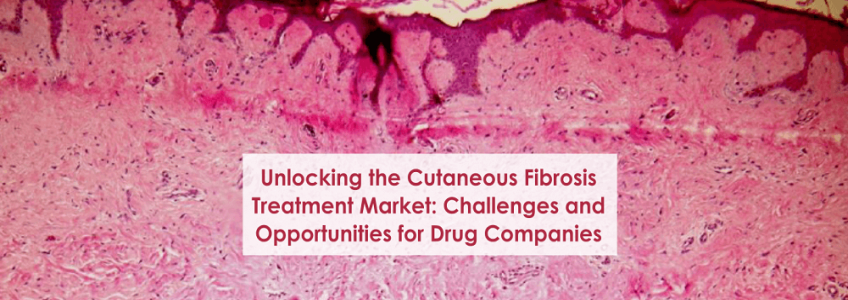Cutaneous fibrosis is a group of diseases characterized by the thickening and hardening of the skin, leading to stiffness and limited mobility. The most common types of cutaneous fibrosis include scleroderma, systemic sclerosis, and localized scleroderma.
The exact causes of cutaneous fibrosis are not well understood, but it is thought to be a result of an overactive immune response leading to the abnormal production of collagen and other extracellular matrix proteins in the skin. Risk factors for cutaneous fibrosis include genetics, environmental exposures, and certain autoimmune diseases.
Symptoms of cutaneous fibrosis can vary depending on the type and severity of the disease but may include thickened and tight skin, limited mobility, and pain. The condition can also affect internal organs, leading to heart and lung problems.
Cutaneous fibrosis is a rare disease, affecting around 1-2 in every 10,000 people worldwide. The disease is more common in women than men and is usually diagnosed between the ages of 20 and 50. The most affected geographies for cutaneous fibrosis are North America, Europe, and Asia. North America and Europe have a higher prevalence of cutaneous fibrosis than other regions, and the disease is more common in Caucasians than in other ethnic groups. In Asia, the disease is more prevalent in the western and northern parts of the continent.
The global Cutaneous Fibrosis Treatment market was valued at US$ 609.2 million in 2022 and is anticipated to reach US$ 874 million by 2029, witnessing a CAGR of 6.2% during the forecast period 2023-2029. The influence of COVID-19 and the Russia-Ukraine War were considered while estimating market sizes.
Europe is the largest Cutaneous Fibrosis Treatment market, with about 32% market share. North America is a follower, accounting for about 30% market share.
The key players are AbbVie, Bayer, Merck, Bristol-Myers Squibb, Sanofi, Boehringer Ingelheim, Roche, GlaxoSmithKline, Pfizer, Novartis, LEO Pharma, Actelion, etc. The top 3 companies occupied about 10% market share.
- Immunotherapy: Immunotherapy aims to modulate the immune response that leads to the abnormal production of collagen and other extracellular matrix proteins in the skin. Drugs such as JAK2 inhibitors, RTH258, and ABBV-368 are examples of immunotherapy that are currently in development or under clinical trials.
- Corticosteroids: Corticosteroids are anti-inflammatory drugs that can help to reduce inflammation and pain associated with cutaneous fibrosis. They can also help to improve mobility and reduce the thickening of the skin.
- Anti-fibrotic drugs: Anti-fibrotic drugs aim to inhibit the production of collagen and other extracellular matrix proteins in the skin. Drugs such as PF-06700841 and GLPG1690 are anti-fibrotic drugs currently developing or under clinical trials.
- Immunoglobulins: Immunoglobulins are proteins that play a role in the immune response. They can be used to help modulate the immune response and reduce inflammation associated with cutaneous fibrosis.
It's important to note that these treatments may not be effective for all patients and may have side effects. It's important to consult with a medical professional to determine the best treatment plan for each individual case.
- Development of novel therapies: There is a significant unmet need for effective treatments for cutaneous fibrosis, providing an opportunity for drug companies to develop novel therapies targeting the underlying mechanisms of the disease.
- Targeted therapies: There is a growing understanding of the molecular and cellular mechanisms underlying cutaneous fibrosis, providing an opportunity for drug companies to develop targeted therapies that specifically target key pathways involved in the disease.
- Combination therapies: Cutaneous fibrosis is a complex disease with multiple underlying causes, allowing drug companies to develop combination therapies that target multiple pathways involved in the disease.
- Repurposing existing drugs: There is a growing interest in repurposing existing drugs for the treatment of cutaneous fibrosis, providing an opportunity for drug companies to investigate the use of existing drugs in the treatment of this disease.
- Orphan drug development: Cutaneous fibrosis is a rare disease, making it eligible for orphan drug designation and providing an opportunity for drug companies to develop treatments for this patient population.
- Personalized medicine: The genetic and molecular heterogeneity of cutaneous fibrosis provides an opportunity for drug companies to develop personalized medicine approaches, targeting specific subgroups of patients with specific genetic or molecular profiles.
JAK2 (Janus kinase 2) is a protein that plays a role in cell signaling and is involved in the development of fibrosis, which is the formation of excess fibrous tissue in the body. JAK2 inhibitors are a type of drug that can inhibit the activity of JAK2 and, thus, potentially reduce fibrosis.
JAK2 inhibitors are being studied as a potential treatment for skin fibrosis, as they may reduce the activity of the cells that contribute to the formation of fibrous tissue. However, more research is needed to fully understand the potential benefits and risks of JAK2 inhibitors for treating skin fibrosis. JAK2 inhibitors are still in the clinical trial phase, and their safety and efficacy have not yet been established for this specific indication.
1. Gilead Sciences:
Gilead Sciences is a biopharmaceutical company that develops and markets drugs for treating infectious diseases and cancer. One of the drugs in its pipeline is a JAK2 inhibitor. JAK2 is a protein critical in developing certain blood cancers, such as myelofibrosis and polycythemia vera. JAK2 is a protein that plays a role in developing certain skin fibrosis conditions, such as scleroderma. Scleroderma is a chronic connective tissue disorder characterized by the hardening and thickening of the skin and damage to internal organs. JAK2 inhibitors, like the one in Gilead's pipeline, have shown promise in treating the underlying inflammation and fibrosis in scleroderma.
2. Novartis:
RTH258 is a JAK2 inhibitor developed by Novartis for treating myelofibrosis, a type of bone marrow cancer. Myelofibrosis is characterized by abnormal growth of fibrous tissue in the bone marrow, leading to blood cell dysfunction. RTH258 works by inhibiting the activity of JAK2, a protein that plays a critical role in developing myelofibrosis. Novartis has completed Phase 1 and 2 clinical trials of RTH258, with positive results in terms of safety and efficacy. However, it's still in the clinical trials phase, and regulatory agencies have not yet granted its approval for use.
3. AbbVie:
ABBV-368 is a JAK2 inhibitor developed by AbbVie for treating myelofibrosis. AbbVie has completed Phase 1 and 2 clinical trials of ABBV-368, and it's in the phase 3 clinical trial stage
4. Pfizer:
Pfizer PF-06700841 (also known as Ruxolitinib) is a JAK2 inhibitor that Pfizer is developing to treat various diseases, including skin fibrosis. The drug was first identified as a JAK2 inhibitor in a high-throughput screening campaign. It has been shown to inhibit the activity of JAK2 and other JAK family members, reducing fibrous tissue formation in the body. Pfizer PF-06700841 is currently being studied in clinical trials for treating skin fibrosis and other fibrotic conditions such as idiopathic pulmonary fibrosis and myelofibrosis.
5. Galapagos:
Galapagos GLPG1690 (also known as Filgotinib) is an oral, selective JAK1 inhibitor developed by Galapagos and Gilead. It is being studied as a potential treatment for various inflammatory and fibrotic conditions, including skin fibrosis.
Like JAK2, JAK1 is a protein that plays a role in cell signaling and is involved in the development of fibrosis. GLPG1690 works by inhibiting the activity of JAK1, which can reduce the formation of fibrous tissue in the body. Galapagos GLPG1690 is currently in Phase 2 clinical trials for treating skin fibrosis and other fibrotic diseases, such as idiopathic pulmonary fibrosis.
6. FibroGen:
FibroGen FG-3019 is an investigational drug developed by FibroGen for treating fibrotic diseases, including idiopathic pulmonary fibrosis (IPF) and skin fibrosis. FG-3019 is a small molecule inhibitor of connective tissue growth factor (CTGF), a protein that plays a critical role in the development of fibrosis. FG-3019 works by inhibiting the activity of CTGF, which can reduce the formation of fibrous tissue in the body. Fibrogen is currently in phase 2 trials for treating IPF, and in preclinical studies for treating skin fibrosis.
Please note that the above list is not exhaustive, and more companies are working on therapies for Cutaneous Fibrosis. These companies are also engaged in clinical trials; some have yet to be approved by the FDA or other healthcare regulatory bodies.
Market research can help drug companies identify and understand the opportunities in the cutaneous fibrosis treatment market in several ways:
- Identifying unmet needs: Market research can help drug companies identify the unmet needs of patients and physicians in the cutaneous fibrosis treatment market, providing insights into areas where new therapies are needed.
- Understanding the disease: Market research can help drug companies understand the underlying causes and mechanisms of cutaneous fibrosis, providing insights into the potential targets for new therapies.
- Identifying target populations: Market research can help drug companies identify the patients most likely to benefit from new therapies for cutaneous fibrosis, helping to guide development and commercialization efforts.
- Assessing market potential: Market research can help drug companies assess the size and growth of the cutaneous fibrosis treatment market, providing insights into the potential revenue opportunities for new therapies.
- Identifying competitors: Market research can help drug companies identify and understand the competitive Landscape in the cutaneous fibrosis treatment market, providing insights into the strengths and weaknesses of existing and potential competitors.
- Monitoring trends: Market research can help drug companies monitor trends in the cutaneous fibrosis treatment market, including changes in patient demographics, disease management practices, and reimbursement policies, helping to anticipate and respond to changes in the market.
Suggested Reports for Investors/Decision Makers
Disclaimer: The products mentioned here are not intended to diagnose, treat, cure, or prevent any disease. The information provided on this blog is marketing material for the informational purposes of pharma manufacturers, investors, and chemical manufacturers and should not be considered medical advice. Always consult with a qualified healthcare professional before taking any medication or supplement.







